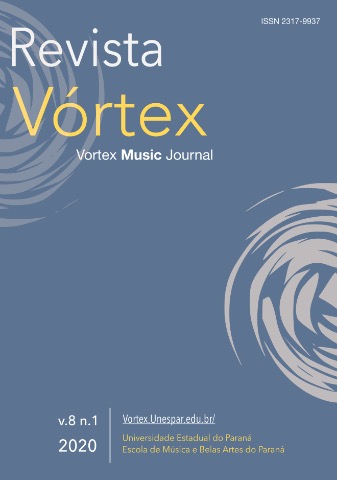The Practice of Teaching Composition
DOI:
https://doi.org/10.33871/23179937.2020.8.1.1-11Resumo
In this essay, composer Dániel Péter Biró reveals his methodology and trajectory as a professor of music composition in the last 16 years. Biró explains how can one teaches a creative artistic process nowadays, in a globalized musical culture, which is full of possibilities for development of cultural diversity while simultaneously providing students distractions driven by capitalist paradigms. How can one help each student to develop his/her own musical language? For this task, Biró talks about how composition today is creative process highly grounded in intellectual and interdisciplinary approaches, sharing similarities with other areas of research such as philosophy and history. For this task, the composer relies on musical analysis in his seminars and individual lessons as one of the strongest methodologies to learn composition, alongside integrating music technology and contemporary performance practice research. [note by editor].
Downloads
Referências
BARRETT, M. S., & GROMKO, J. E. (2007). Provoking the muse: a case study of teaching and learning in music composition. Psychology of Music, 35(2), 213–230. https://doi.org/10.1177/0305735607070305
BIRÓ, Dániel Péter; VAN KRANENBURG Peter. "A Computational Re–Examination Of Bela Bartok"™s Transcription Methods as Exemplified by his Sirato Transcriptions of 1937/1938 and their Relevance for Contemporary Methods of Computational Transcription of Qur"™an Recitation," in Holzapfel, A. (ed.). Proceedings of the Fourth International Workshop on Folk Music Analysis (FMA2014). Istanbul: Bogazaci University, 2014, 70-77,
BIRÓ, Dániel Péter; VAN KRANENBURG, Peter, NESS, Steven: TZANETAKIS, George: VOLK, Anja. "Stability and Variation in Cadence Formulas in Oral and Semi-Oral Chant Traditions – a Computational Approach," in Proceedings of the 12th International Conference on Music Perception and Cognition and the 8th Triennial Conference of the European Society for the Cognitive Sciences of Music. Thessaloniki. 2012, 98-105
BIRÓ, Dániel Péter; GOLDMAN, Jonathan; HEUSINGER, Detlef; STRATZ, Constanze. Live Electronics im/in the SWR Experimentalstudio. Wolke Verlag, 2018.
BIRÓ, Dániel Péter; KREBS, Harald. The String Quartets of Béla Bartók: Tradition and Legacy in Analytical Perspective. New York: Oxford University Press, 2014.
EPSTEIN, S. Epi on education. Canadian Jewish News, 08 sep. 2005.
GOLDWURM, SCHORR, H., MALINOWITZ, Y., C., SCHOTTENSTEIN, E., & MESORAH HERITAGE FOUNDATION. (1997). Talmud Bavli: The Gemara: The classic Vilna edition, with an annotated, interpretive elucidation, as an aid to Talmud study = Talmud Bavli (Mixed ed., ArtScroll series). Brooklyn, N.Y.: Mesorah Publications.
GRISEY, Gérard Grisey. Tempus ex Machina: A composer's reflections on musical time. Contemporary Music Review, 2/1 (1987): 239-275.
SHINAN, Avigdor. Pirkei Avot: A New Israeli Commentary. Jerusalem: Avi Hay Foundation and Yedioth Ahronoth, 2009.
VAN KRANENBURG, Peter; BIRÓ, Dániel Péter, NESS, Steven; TZANETAKIS, George, "A Computational Investigation of Melodic Contour Stability in Jewish Torah Trope Performance Traditions". In: Proceedings of the 12th International Society for Music Information Retrieval Conference, Miami, 2011, 163-168.
Downloads
Publicado
Como Citar
Edição
Seção
Licença
Copyright (c) 2020 Dániel Péter Biró

Este trabalho está licenciado sob uma licença Creative Commons Attribution 4.0 International License.
Autores mantêm os direitos autorais e concedem à revista o direito de primeira publicação, com o trabalho simultaneamente licenciado sob a Licença Creative Commons Attribution que permite o compartilhamento do trabalho com reconhecimento da autoria e publicação inicial nesta revista.






